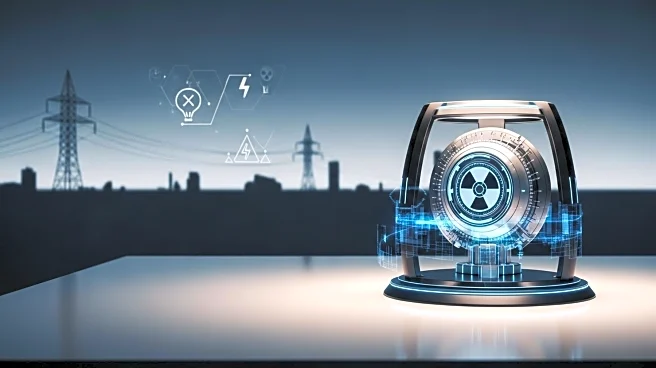What's Happening?
NuScale Power has entered into a significant partnership with ENTRA1 Energy and the Tennessee Valley Authority (TVA) to deploy up to 6 gigawatts of small modular reactors (SMRs) across TVA's service region. This collaboration marks the largest SMR deployment program in U.S. history, aligning with the Biden-Harris Administration's energy security goals. The partnership aims to address the growing demand for reliable, carbon-free baseload power, particularly in energy-intensive sectors such as AI data centers and semiconductor manufacturing. NuScale's SMRs, approved by the NRC, offer scalable and carbon-free power solutions, supported by TVA's infrastructure and ENTRA1's project expertise.
Why It's Important?
The partnership between NuScale, ENTRA1, and TVA is pivotal for the clean energy transition, positioning the U.S. as a leader in next-generation nuclear innovation. By leveraging public-private partnerships, the initiative accelerates the deployment of advanced nuclear technologies, crucial for meeting the nation's energy needs. The collaboration addresses the surging demand for electricity in sectors requiring stable, high-capacity power sources. NuScale's SMRs are uniquely suited to provide this, capturing a significant share of the SMR sector projected to grow at a compound annual rate of 6.74% through 2030.
What's Next?
NuScale's financial performance and market positioning highlight opportunities and challenges. Despite a Q2 revenue shortfall, the company maintains strong liquidity, supporting long-term growth. Analysts have mixed views, with some raising price targets while others caution about high capital costs and regulatory risks. The broader SMR market presents a compelling growth trajectory, with the global SMR construction market projected to reach $9.34 billion by 2030. NuScale's recent approval of its 77-megawatt electric design strengthens its competitive position, enabling the company to target a wider range of applications.
Beyond the Headlines
The TVA-ENTRA1-NuScale collaboration could catalyze broader adoption of nuclear energy as a complement to intermittent renewables. SMRs are uniquely suited to decarbonize energy-intensive industries and provide grid stability in regions with high renewable penetration. The project focuses on powering AI data centers and advanced manufacturing, aiming to decouple economic growth from carbon emissions. This dual approach, combining SMRs with natural gas as a transitional fuel, highlights the pragmatic strategy required to achieve net-zero goals.








